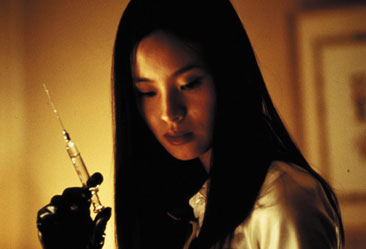PINS & NEEDLES
MIIKE TAKASHI WAS THE STAR AT THE ROTTERDAM FILM FESTIVAL, WHERE HE WON THE INTERNATIONAL CRITICS’ PRIZE FOR AUDITION, A TERRIFYING TALE OF LOVE, SEX AND TORTURE. CHUCK STEPHENS REPORTS ON THIS LEADING FIGURE IN JAPAN’S NEW AND IMPOLITE GENRE FILM SCENE.
Although he may have gotten off to something of a late start, 40-year-old Takashi Miike’s been making up for lost time ever since his feature debut, 1995’s Shinjuku Triad Society – a scabrous essay in police procedures, pleasurable sodomy, and interracial politics in the Japanese underworld – won him a Best Director nomination by the Japan Motion Picture Producers Association. Eight features later, Miike (pronounced mee-kay), a former assistant to Shohei Imamura (director of 1960’s New Wave classics The Insect Woman and The Pornographers, and the founder of Japan’s leading film school), is poised to break out of his status as festival favorite and into the potentially Kitano-esque proportions of international cult hero.
And the secret to his success may have been a simple laundry bag. That’s all it took to send packed houses at the recent Vancouver and Rotterdam screenings of Miike’s first horror flick – the slow-building, nerve-pinching Audition – into spasmodic jolts of unison gasping: a little mood music, a lumpy laundry bag and the possibility that something potentially quite awful indeed might be lurking inside it. Written by Ryu Murakami (the notorious novelist/director behind Tokyo Decadence), Audition revolves around a lonely man, a young actress, a haunted ballet studio, and the sweet, singing sound piano wire makes when it saws through flesh and bone. To say the film keeps you on pins and needles – well, you get the point.
Miike worked on countless direct-to-video projects, pornographic and otherwise, before Shinjuku Triad Society established his facility for manic pacing, splintered cutting, and situations where kinky sex is upstaged by kinkier politics. In the thematically interrelated Rainy Dog (shot in Taiwan, with a Taiwanese crew and dialogue) and Ley Lines, Chinese tough guys fight for cultural turf rights with Japanese mobsters – even though they can barely speak one another’s language. And in the electrified boogie of 1998’s Blues Harp, the stakes are higher still: Chuji – a mixed-race kid from Okinawa, half Japanese, half African American – saves a yakuza rank-climber named Kenji, who in turn falls in love with the sight of his savior’s bare ass. Homoerotic jealousies are the least of the film’s complications, though, as the whole thing climaxes with an jaw-dropping evocation of a shuffling Uncle Remus, straight out of Walt Disney’s Song of the South.
The only chance U.S. audiences have of seeing anything Miike at the moment is to rent a copy of his ultraviolent manga adaptation, Fudoh: The New Generation (available from Tokyo Shock Video) – a gory teen-yakuza epic in which death-dealing schoolgirls splatter Fujiyama-size tough guys with a flex of their groin muscles. Fudoh can’t touch the political frenzy of the director’s unhinged, social-science yakuza films, or the ruthless excruciations of Audition’s meat-tenderizing love story, but until some U.S. distributor shirks their Made-In-Japan-o-phobia, it’ll have to suffice. In the meantime, potential Miike fans will just have to wait for the other shoe – with a freshly severed foot still inside it – to drop.
VOD CALENDAR


 See the VOD Calendar →
See the VOD Calendar →



